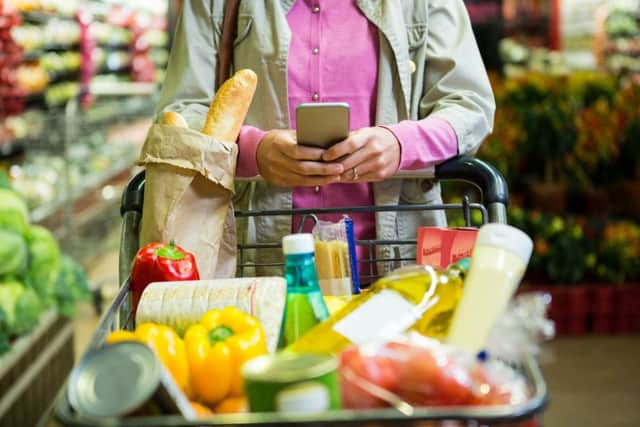Scots shoppers '˜hit by £400 Brexit price hike since referendum vote'
and live on Freeview channel 276
The price of everyday goods such as sliced bread, milk and butter has increased sharply in the past two years because of the falling value of the pound since the decision to leave the EU, according to the study by the People’s Vote campaign.
There are growing calls for a second vote on the final Brexit deal amid fears the cost hikes will only get worse after the UK’s formal departure in March.
Advertisement
Hide AdAdvertisement
Hide AdUncertainty over the Brexit negotiations has also meant inflation in the UK has been higher than in other eurozone countries, fuelling the significant increase in the cost of living.


According to the campaigners, the average Scottish household bill has risen by £1,269 a year since Brexit. They say this is £417 higher than it would have been had we voted to Remain.
However, the research was disputed by the Scottish Conservatives, which described it as “far-fetched and unconvincing” because it made simplistic assumptions about the causes of inflation.
The data is based on Office for National Statistics (ONS) figures for the average annual household spend in Scotland.
Advertisement
Hide AdAdvertisement
Hide AdLiberal Democrat leader Willie Rennie said: “For hard-working families across Scotland, Brexit means bills, bills, bills.
“Hiking the price of bread, butter and milk would hammer those who struggle to make ends meet.That’s why representatives from all parties should join us in calling for a say on the final Brexit deal.”
The price of 250g of butter averaged £1.36 in June 2016 and now costs £1.79 – an increase of 43p. A 227g packet of coffee is up 26p. Bread has risen by 4.5 per cent (6p a loaf), while sausages are up 45p a kilo on average. Salmon fillets have gone up by £2.81 a kilo.
Scots trying to eat healthily have also been hit hard. Apples are up by 13p a kilo, superfood broccoli is up by 29p and tomatoes are 15p a kilo more expensive. The cost of a glass of wine has shot up by 21p a glass and a whisky nip is up from £2.69 to £2.87.
Advertisement
Hide AdAdvertisement
Hide AdEmma Currie, a Scottish actor and a supporter of People’s Vote, said: “These figures show Brexit is already hitting everyone’s pockets in Scotland hard and we haven’t even left the EU yet. Uncertainty and the risk of no-deal or a bad deal is already having an impact on our economy. That’s really frustrating for so many Scots who voted to stay part of the EU by a large margin.
“Despite the promise of increased funds for the NHS, greater prosperity and more money for government spending, this hasn’t materialised. Instead we’re seeing tighter budgets and less money in our pockets.
“As a mother, it’s worrying to see the impact on our daily and family lives.”
Supermarket giants have warned the Treasury a no-deal Brexit would force up the price of the average weekly food basket by as much as 12 per cent.
Advertisement
Hide AdAdvertisement
Hide AdSenior executives from some of the big four supermarkets made the alarming prediction in briefings to the Treasury on the impact on food prices of a no-deal Brexit.
The biggest tariffs on imports from the EU could include cheese, up by 44 per cent, and beef, up by 40 per cent. Tariffs on chicken could rise by 22 per cent.
It comes amid growing fears about the collapse of the negotiations with the EU as the stalemate continues over Theresa May’s Chequers plan.
Trade Secretary Liam Fox warned recently that no deal was the most likely scenario after the UK’s departure.
Advertisement
Hide AdAdvertisement
Hide AdIt emerged over the weekend UK voters are now ready to back Remain in a rerun of the EU referendum, as polling research indicated more than 100 Westminster constituencies that backed Leave in the 2016 referendum would switch their preference.
But there is little sign of any imminent move by the SNP leadership to get behind such a second vote.
First Minister Nicola Sturgeon has only said she will not stand in the way of a second vote, but other figures such as Brexit minister Mike Russell and Edinburgh East MP Tommy Sheppard have been more enthusiastic. The precedent it may set for a rerun of a future independence referendum Yes vote is at the heart of SNP concerns.
SNP Europe spokesman Peter Grant called on Mrs May to step back from the “cliff edge” and work with the devolved institutions to avoid a hard Brexit.
Advertisement
Hide AdAdvertisement
Hide Ad“The UK government is leading the economy and business community down the path of economic self-sabotage if it continues to sideline Parliament, ignore devolved administrations and push aside warnings by organisations,” he said.
“It’s high time Theresa May ended the narrow-minded approach and instead worked with the devolved governments in order to protect our economy, businesses and hundreds of thousands of jobs.”
A spokesman for the Scottish Tories questioned the research and said it was wrong to include alcohol prices, which had increased across the board in Scotland due to the introduction of minimum unit pricing in May.
He said: “There are any number of things that can contribute to price rises. Simply blaming Brexit, something that hasn’t happened yet, is fanciful.
Advertisement
Hide AdAdvertisement
Hide Ad“No one doubts there will be challenges thrown up by leaving the EU, as well as opportunities, but this research is far- fetched and unconvincing.”
A UK government spokeswoman said: “The UK has an excellent level of food security built on access to a range of sources, including strong domestic production and imports from third countries. This will continue to be the case after exit.”